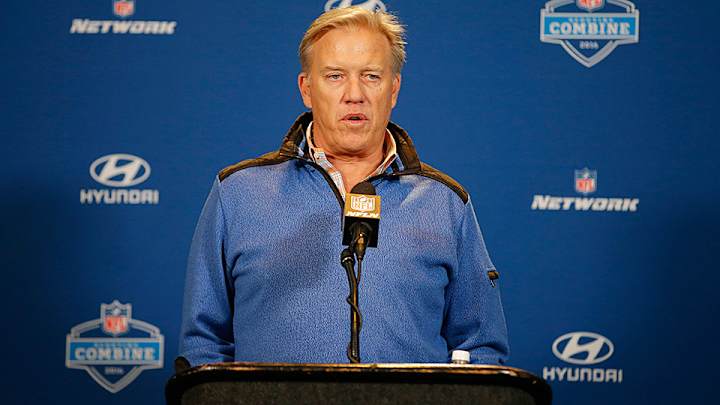Elway has excelled in building Broncos for life after Manning

INDIANAPOLIS—Less than 48 hours before John Elway announced his retirement on May 2, 1999, Broncos owner Pat Bowlen tried to convince his quarterback to return for a 17th season. Elway, after months of deliberation, said no. He’d weighed his options and decided that another NFL off-season would be too much. He’d taken his time to decide. He was sure.
Seventeen years later, Elway knows the value of time. He knows Peyton Manning, on the heels of his second Super Bowl victory just as the Duke was when he retired, has earned it. In his 12 minutes with the media at the NFL combine in Indianapolis on Thursday afternoon, the Broncos general manager answered several rounds of questions about Manning before cutting off the discourse. “We’re going to give him as much time as he needs,” Elway said of his 39-year-old (soon to be 40-year-old) quarterback, “and he still needs some more time.” That was his message throughout. Period. End of story.
Top QBs ward off their weak points as combine circus begins
It’s a situation that mirrors Elway’s in so many ways—except, of course, that it’s impossible to imagine anyone in the Broncos organization begging Manning to return, especially at his $19 million price tag. That salary figure will become guaranteed on March 9, and no matter how often Elway and Broncos coach Gary Kubiak stress patience as they wait for their quarterback’s decision, the clock ticks toward that date. It’s the deadline that lingers at the end of every sentence Elway and Kubiak utter, and it's the moment when this earned deference to Manning, this stalemate, has to end.
That’s when the dominoes can fall, and for a team set to lose arguably the greatest quarterback of all time, the Broncos have quietly built themselves the strongest infrastructure to ease their transition—a transition that’s already underway. By 2015, just two years removed from posting the greatest offensive season in NFL history, Denver was a defensive juggernaut, the league’s best unit under new coordinator Wade Phillips. As it builds in the aftermath of Manning, it will build to bolster that identity.
It’s one that was almost impossible to imagine two years ago, when Denver, coming off a Super Bowl embarrassment at the hands of Seattle, had an injured defense with some upside and not much of a track record. Von Miller was just months removed from his drug suspension, still viewed as an immature player with tremendous potential. Brock Osweiler was tall. That’s all anyone knew. He’d completed a total of 13 NFL passes, and even at practices, it was hard to tell how much work the quarterback got with the first-team offense, if any.
Now, the two are arguably Denver’s most important off-season priorities. They’ve developed into a franchise cornerstone and a raw quarterback who, despite his lack of experience, put Denver in position to make its postseason run. “We wouldn’t have been world champs without Brock,” Elway said Thursday.
Both are free agents. Both should return in 2016. And growing Denver’s roster from a supporting cast to a young core that can stand on its own, while issuing few, if any, onerous contracts, is perhaps Elway’s greatest achievement as general manager.
For years, Elway has fielded questions about the win-now nature of his teambuilding, never more than two off-seasons ago, when he inked Aqib Talib, DeMarcus Ware and T.J. Ward to bolster his defense. Each was signed to a relatively team-friendly contract, though at the time, it seemed as if Denver was throwing cash at its short-term future with no thought for the post-Manning world. Then, in 2015, a world without Manning came early (if temporarily). And what followed was the championship win that was the end game of it all, but with Von Miller and the defense playing the part of the hero.
Despite the Manning-centric nature of questioning Kubiak and Elway faced this week, Denver’s most pressing priority this off-season is Miller. On Thursday, Elway said that the team and Miller’s camp have “exchanged some offers,” and as the franchise tag deadline of March 1 looms, the Broncos still hope to come to an agreement on an extension rather than apply said tag. In that scenario, they could franchise defensive end Malik Jackson or let him walk in order to invest in their linebacking corps (both Danny Trevathan and Brandon Marshall are free agents), while also presumably retaining Osweiler, who would welcome a contract to be the presumed starter.
Size matters? QB Brandon Allen trying to make his hands bigger
Depending on what route the team takes, it could be in store for some salary cap gymnastics. That could mean cutting a guy like left tackle Ryan Clady, who’s missed two of the past three seasons with injuries and is due $9.5 million in guaranteed money next year, or restructuring his contract. Even so, Clady’s will be the team’s only potentially burdensome deal if and when Manning is off the books, and it currently carries less than $1 million in dead money. In NFL parlance, that’s pennies.
Of course Denver will face questions if it chooses to commit to Osweiler, who’s started just seven games in his career, and 2015’s defensive performance will be a hard act for any unit to follow. That said, for a team about to lose the player that defined its past four seasons and an entire generation in the NFL, the Broncos stand on solid footing. That’s a credit to Elway, who watched his team go 6–10 in the season after he retired and make the playoffs in only one of the next four years. He has built these Broncos for a different future.

Staff writer Joan Niesen returned to SI in 2014 after first coming to SI as an intern while in graduate school. She covers college football and the NFL.